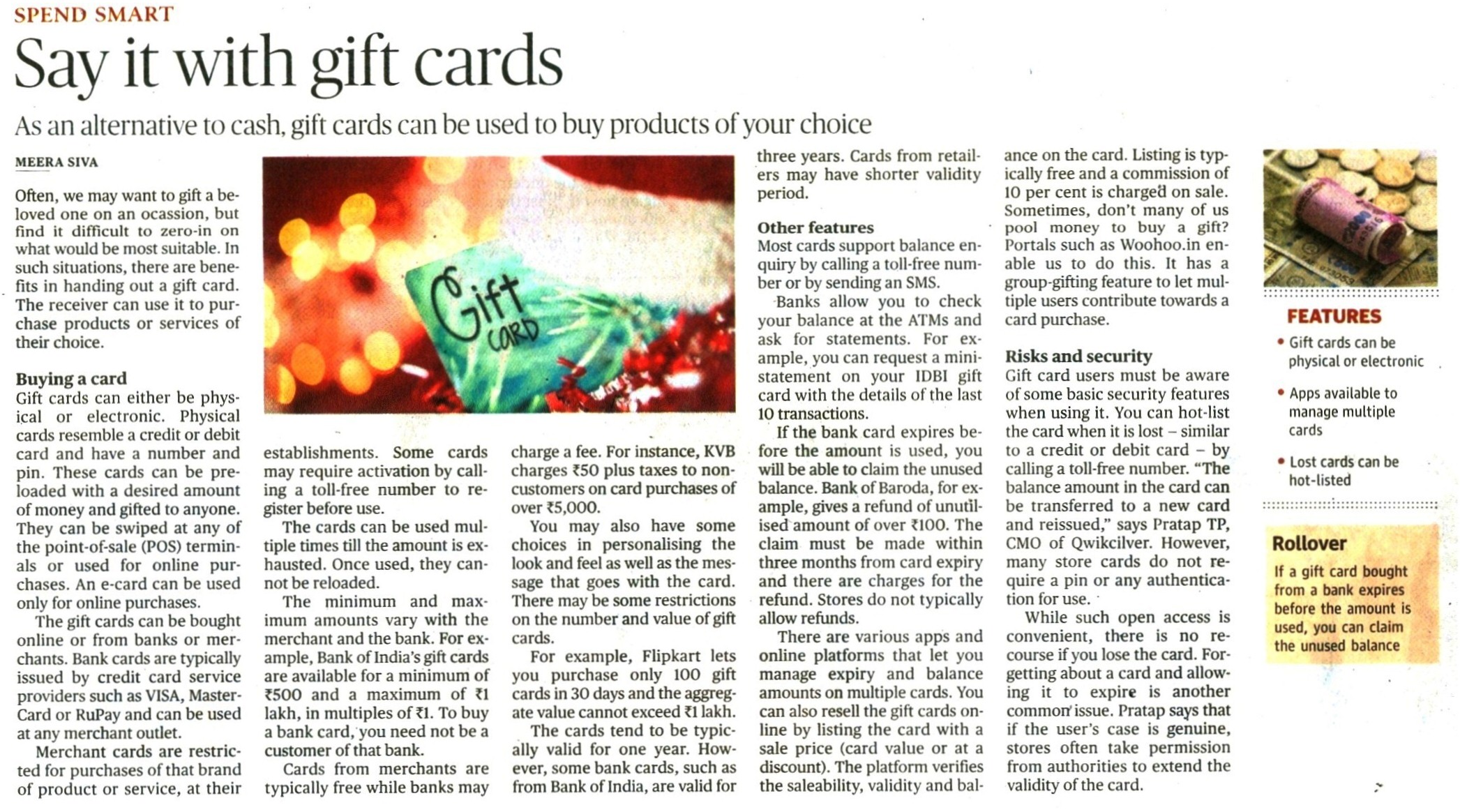The coverage received for Qwikcilver & Woohoo in both The Hindu Business Line and The Hindu on 6th August 2017, in a special column ‘Spend Smart’.
Often, we may want to gift a beloved one on an occasion, but find it difficult to zero-in on what would be most suitable. In such situations, there are benefits in handing out a gift card. The receiver can use it to purchase products or services of their choice.
Buying a card
Gift cards can either be physical or electronic. Physical cards resemble a credit or debit card and have a number and pin. These cards can be preloaded with a desired amount of money and gifted to anyone. They can be swiped at any of the point-of-sale (POS) terminals or used for online purchases. An e-card can be used only for online purchases.
The gift cards can be bought online or from banks or merchants. Bank cards are typically issued by credit card service providers such as VISA, MasterCard or RuPay and can be used at any merchant outlet. Merchant cards are restricted for purchases of that brand of product or service, at their establishments. Some cards may require activation by calling a toll-free number to register before use. The cards can be used multiple times till the amount is exhausted. Once used, they cannot be reloaded.
The minimum and maximum amounts vary with the merchant and the bank. For example, Bank of India’s gift cards are available for a minimum of ₹500 and a maximum of ₹1 lakh, in multiples of ₹1. To buy a bank card, you need not be a customer of that bank.
Cards from merchants are typically free while banks may charge a fee. For instance, KVB charges ₹50 plus taxes to non-customers on card purchases of over ₹5,000.
You may also have some choices in personalising the look and feel as well as the message that goes with the card. There may be some restrictions on the number and value of gift cards. For example, Flipkart lets you purchase only 100 gift cards in 30 days and the aggregate value cannot exceed ₹1 lakh.
The cards tend to be typically valid for one year. However, some bank cards, such as from Bank of India, are valid for three years. Cards from retailers may have shorter validity period.
Other features
Most cards support balance enquiry by calling a toll-free number or by sending an SMS. For store cards, a balance enquiry can be made at the time of purchase. Banks allow you to check your balance at the ATMs and ask for statements. For example, you can request a mini-statement on your IDBI gift card with the details of the last 10 transactions.
If the bank card expires before the amount is used, you will be able to claim the unused balance. Bank of Baroda, for example, gives a refund of unutilised amount of over ₹100. The claim must be made within three months from card expiry and there are charges for the refund. Stores do not typically allow refunds. There are various apps and online platforms that let you manage expiry and balance amounts on multiple cards. You can also resell the gift cards online by listing the card with a sale price (card value or at a discount). The platform verifies the saleability, validity and balance on the card. Some sites require you to hand over the physical card to them on listing. Others such as Woohoo.in make the old card void (if issued by them) and list a new card to ensure safety. Listing is free and a commission of 10 per cent is charged on sale. Sometimes, don’t many of us pool money to buy a gift? Portals such as Woohoo.in enable us to do this. It has a group-gifting feature to let multiple users contribute towards a card purchase.
Risks and security
Gift card users must be aware of basic security features. You can hot-list the card when it is lost — similar to a credit or debit card — by calling a toll-free number. “The balance amount in the card can be transferred to a new card and reissued”, says Pratap TP, CMO of Qwikcilver. However, many store cards do not require a pin or any authentication for use. While such open access is convenient, there is no recourse if you lose the card. Allowing a card to expire is another common issue. Pratap says that if the user’s case is genuine, stores often take permission from authorities to extend the validity of the card.
